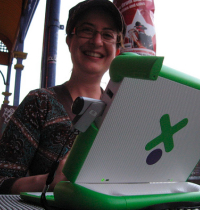I've been asked a few times why OLPC deployments in Australia are relevant to the OLPC vision. I thought I'd do a blog post about what OLPC Friends is trying to achieve in supporting local projects, and why I've been so keen to get local trials happening in Australia. Feedback welcome.
- Need in Australia - there are many children in Australia who are in serious need. Whether it be in remote Indigenous Australia, or living in poverty in metropolitan areas. Supporting projects for these children is a key goal of OLPC Friends for Australia, New Zealand and throughout the Pacific. The first Australian trial includes some children from extremely disadvantaged communities (including a remote Indigenous family) as well as typical kids to ensure that the technology meets both the specific needs of disadvantaged children as well as the typical education requirements of an Australian school. Details of this trial (including some videos and learning activities) are here.
- Funding the Pacific - By rolling laptops out to Australian schools at a premium rate, the funding raised can go directly to Pacific countries who don't have access to funding or resources to help them with OLPC rollouts and funding volunteers to work on deployments. Then organisations like AusAID can also work in collaboration with education departments to fully fund Pacific projects.
- Supporting the Pacific - Throughout Australia and New Zealand there are loads of technical people and educators who are willing to volunteer for helping with OLPC trials right throughout the region. Many of them have already signed up on the OLPC Friends volunteers page. The more people who have skills the better we can support implementers and educators throughout the Pacific to improve both the resources available and the education levels of all children in the region.
- Cultural connections - One fantastic opportunity is to use the collaboration tools (such as the Videochat activity) and the ability to connect to another school to connect children up directly. This means opportunities for cultural sharing, awareness and ultimately for opening doors to opportunity and knowledge for children all over the region. We already have schools interested in this kind of cultural exchange, and I'm really excited to be able to facilitate this.
- Remote training - One important element of Australia's first trial is using the connectivity (Videochat, Jabber, Write, etc) to provide remote support to students, in particular literacy training. The learning specialist can provide literacy lessons for children in remote areas that don't have the local skills for the special education requirements. The OLPC schoolserver (XS) also includes Moodle for eLearning. Building up local resources for remote learning such as literacy, teacher training, and online classes means that the whole region (and world) can benefit and utilise these resources and potentially these services to improve their education and training options.
Basically, I believe that OLPC deployments in Australia and New Zealand can - with appropriate strategic planning and collaboration - have profound and sustainable positive impacts for the Pacific, while also addressing serious and general local needs in each country. I believe this kind of regional approach ensures an organic, sustainable, and ultimately community-oriented strategy.
I also believe that rolling out individual laptops to people when there isn't that education and school-based approach ultimately doesn't contribute strongly to the vision of OLPC. As we see many more schools around the world taking on OLPC in the classroom, I think we'll see that a very large percentage of the value of the technology is only found when all the children in the classroom are connected together and online, and when it is integrated into their normal school curriculum.
Now that anyone can buy laptops in bulk (minimum order 100) for a reasonable price (USD$259 for over 100, $219 for over 1000) in the "Change the World" program, I hope that people will start realising that these devices need to be in the classroom, not in their Christmas stocking. For anyone interested in doing deployments you can check out the OLPC Deployment Guide and if you want any help, check out OLPC Friends and can register, sign up for volunteering, get involved and find others who have skills and interest in the project.
We're going to start regular online meetings soon, and some face to face meetings in various cities across the region (Adelaide and Wellington already have regular meetings :), so there are plenty of ways to participate.
This article was originally posted on What are we doing today, brain? and is republished here with Pia Waugh's permission.



Pia, keep up the great work!
There is a 6th reason. Your work helps other deployments in other countries like Nepal. You guys (aussies) are especially great at documenting and communicating your work to the rest of the community.
Thanks Bryan! Quick edit (which I've updated on my own blog), the cheaper price for laptops are for the least developer nations and "partner countries" as defined here:
http://wiki.laptop.org/go/Change_the_world#What_is_the_cost_of_a_Change_the_World_donation.3F
Sorry for the confusion!